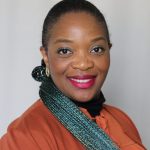heading
PROJECT: THE WOMEN IN WATER DIPLOMACY NETWORK IN THE NILEReport back: Nile engagement 2023
Since the last issue of the Women in Water Diplomacy Network Newsletter, Nile Network members have been hard at work advancing Network objectives in diverse engagement tracks. Here are some examples.
A tribute to Theresa Khakasa Wasike on behalf of the Women in Water Diplomacy Network as she completes her role on the Network’s Leadership Council
By Dr Zodwa Dlamini, Women in Water Diplomacy Leadership Council Member
It is often said that African women and girls form their relationships with their peers during those trips fetching water from the village water sources, be it a well, lake, communal tap, or a river. The same can be said about how we first met and got to know Theresa Khakasa Wasike at the waterhole of the Women in Water Diplomacy Network.
Since the establishment of the Women in Water Diplomacy Network in the Nile Basin in Uganda 2017, subsequent Network Forums took place in Ethiopia in 2018, and in Kenya in 2020 just before COVID-19 brought the world into an unprecedented abrupt stop. Invariably, the Women in Water Diplomacy Network’s activities were not spared the disruption – albeit for only a little while. Elizabeth Koch and Julienne Ndjiki’s resilience was unparalleled as they steered the Network through the uncertainties of the pandemic. Adaptive management was adopted, and all activities continued virtually notwithstanding the various internet connectivity challenges, personal losses, and isolation our members experienced. It is however essential to note that during 2021 three important milestones were achieved: (i) the Women in Water Diplomacy Network in the Nile Leadership Council was established, (ii) the Women in Water Management Network in Central Asia and Afghanistan was launched, and (iii) commencement of the drafting of the Women in Water Diplomacy Network 2022-2027 Global Strategy lead by Elizabeth, Julienne, the Network’s Process Team, the Leadership Council, and Network members from Central Asia and Afghanistan. The strategy’s consultation processes continued unabated while Elizabeth and Julienne lead the charge with the Leadership Council focusing on the finalizing and launching the strategy at the first ever Global Network Forum just before the World Water Week August 2022 in Stockholm, Sweden. These months of hard work cumulated with the launch of the Women in Water Diplomacy Network’s Global Strategy – turning the tide for women in water diplomacy in transboundary corporation globally.
It is important to state that working remotely during the pandemic also exposed individual’s characteristics and commitments. Many of the members lost their loved ones or colleagues and yet continued to serve our community diligently. Theresa’s dependability, open mindedness, listening skills, flexibility, and willingness to share her experiences and expertise were illuminated during this crucial time. I got to learn that Theresa is not shy to state her opinions tactfully, diplomatically, and always available to serve others.
In August 2022, when we all finally met in person as the Leadership Council in Stockholm, in preparation to host the Global Network Forum, the encounter proved magical and cemented our friendship as the sisterhood of the Global Network. Our collegial bond was deep and vast just like the transboundary river basins we all come from, the atmosphere even more electrical and exhilarating when meeting our sisters from Central Asia and Afghanistan for the first time. Fortunately for Theresa and Gladys Wekesa, another leading Network Member from Kenya, they had already met some of the sisters from Central Asia during the World Water Forum held in Senegal earlier in 2022 and were eager to introduce us to these beautiful sisters.
On a lighter note, during one of our only free days before the commencement of the Global Forum, Theresa and a few sisters decided to hit the streets of Stockholm. Can anyone guess where we went? You are of course right: we went looking for shoes. Theresa had a long list of shoe sizes and colors for colleagues back in Kenya, we teased her and laughed about it. That is Theresa for you, generous in any everyway. During the Global Forum Theresa participated in every task that was thrown her way from organizing seating in our Conference Room at the Estonia House to sharing experience on various discussion panels. I know that Women in Water Diplomacy Network got to experience and acquaint themselves with this committed and dedicated water warrior. Serving the Network together with Theresa, the SIWI Process Support Team has been an honour and privilege I will forever cherish.
About the Network
The Women in Water Diplomacy and Water Management promotes promotes women water professionals’ participation in decision-making in the water sector and gender mainstreaming in water governance, inthe Nile region and Central Asia and Afghanistan.
The Women in Water Diplomacy network in the NileWomen in Water Management in Central Asia and AfghanistanA Path Forward for Women, Water, Peace, and Security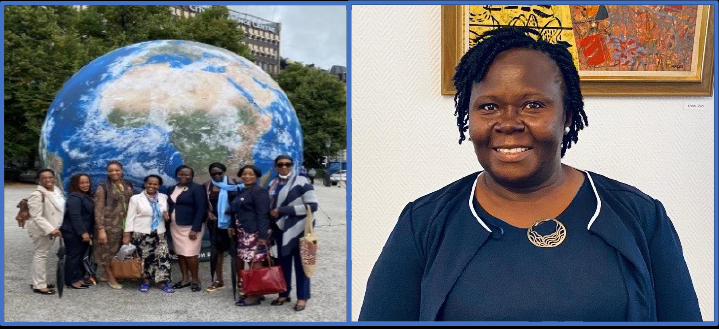
As Theresa completes her service on the Network’s Leadership Council, she leaves an indelible mark etched in our hearts. Like the River Nile that has been flowing for centuries, the beautiful memories and contributions towards uplifting women in the water sector ensuring that their voices are not only heard but are central in managing and negotiating issues of transboundary water cooperation at the highest decision-making level, will forever remain closer to our hearts. As Theresa takes up her new role at Kenya’s Ministry of Labour, we are certain that she will continue to ensure that gender equality is embraced and implemented in all the Ministry’s engagements.
I am forever grateful for the privilege afforded to the Leadership Council to have known and served with Theresa in a small way and to be the force behind the promotion of gender equality, peace and security in transboundary river basins globally. During the conclusion of the 67th Session of the UN Commission on the Status of Women in March 2023, a clarion call was made by “women and girls from all corners of the earth and of all ages and identities underscored the importance of inclusion, gender equitable assistive technology and gender transformative approaches in achieving gender equality in the digital spheres.” In the Ministry of Labour in Kenya, Director Theresa Khakasa Wasike, you are in a position of power where you make decisions, may the voices of all your sisters globally be an impetus for you to push ahead and bring about change notwithstanding the anticipated challenges ahead, after all, you are enough, Sis Theresa.
Confronting the unknown, but not alone. A message from Khartoum, Sudan
By Dr Muna Musnad, Women in Water Diplomacy Leadership Council Member
Only those who lived the reality of war know the true meaning of peace and security… This is how it went for me and for the civilian people in Sudan when war broke out between the Sudanese Army Force (SAF) and the Rapid Support Force (RSF) on 15 April 2023. More than two weeks so far have passed now, where the dominant language has become the sound of bombs and weapons, cutting off access to water, food, electricity and even medicine treatment. In this sever situation I recognized the actual meaning of peace building, security, and conflict disputes.
![WhatsApp Image 2023-05-01 at 10.21.53 (1)[47]](https://siwi.org/wp-content/uploads/2023/05/whatsapp-image-2023-05-01-at-102153-147.jpeg)
Until now, I experienced these words theoretically as I engaged to the field of water diplomacy and joined the Women in Water Diplomacy Network. In this difficult time as I was looking for safety, I rushed to our Network seeking support and to tell my sisters that now I really recognized the value of this Network and its role. Indeed, I am proud to say that I felt safety in the time when the sounds of weapons were approaching my home. As I confronted the unknown, I resorted to our WhatsApp group of the Global Network of Women in Water Diplomacy to tell them that I am not safe. The prompt response from the Network members made me proud. In no time I felt that all the countries in the Nile Basin, Southern Africa, Central Asia and Afghanistan, North America and Europe provided me the internal peace and security that I missed. It is great to feel that the whole world stands with you and protects you from the feeling that you are facing the unknown alone.
Despite our distances, without a doubt, this Network is valuable. Together we are stronger, and we can make a difference in promoting peace and security.
Network Members participate in the Valuing Water Initiative, Cape Town, February 14 – 17, 2023
An event organized by the Kingdom of the Netherlands on the topic of ‘Mainstreaming the Valuing Water perspectives in Africa held back-to-back with the International Water Management Institute (IWMI)’s conference entitled: ‘Transformative Futures for Water Security’.
By Dr Adanech Yared Jillo, Member of the Women in Water Diplomacy Network
Dr Adanech Yared Jillo, Dr Zodwa Dlamini, Ms Xanani Baloyi and Ms Rehab Abd Almohsen represented the Women in Water Diplomacy Network at a Working Session entitled “Mainstreaming the Valuing Water perspectives in Africa” which was held on 14 February 2023 in Cape Town, South Africa and organized by the Valuing Water Initiative of the Kingdom of the Netherlands.
The main objectives of the working session were to re-introduce participants to the UN Principles for Valuing Water and the Valuing Water Initiative, as well as to empower future champions in the region on the issue. The discussions focused on how to mainstream the Valuing Water perspective in the context of sub-Saharan Africa considering some specific local cases, and the concrete needs to achieve this success. Reflections on possible recommendations as inputs for a Regional Water Action Agenda were also provided during the session.
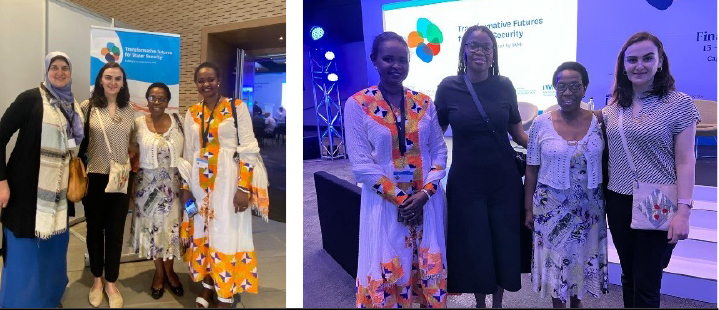
Farangis Ukumatshoeva, Network member from Tajikistan joined the above mentioned members also participated in the Transformative Futures for Water Security (TFWS) Conference organized by the International Water Management Institute (IWMI) which took place in Cape Town on 15 – 17 February 2023. The first day of the meeting was focused on introducing and embracing the Water Transformative Themes and Envisaging Transformative Futures through bold thinking. The second day created space to imagine an ideal world (e.g: ‘the brain dump wall’) and elaborate how Transformative Themes could contribute to it whilst the last day focused on formulating Challenges and Mission for TFWS, as well as elaborating a road map towards the UN Water Conference 2023. The members of the Women in Water Diplomacy actively participated in all the sessions of the events and contributed to elevating the women’s voices.
The events were also a great opportunity for the Women in Water Diplomacy Team Members to unite once more and reflect on the strategy launched at the Global Network Forum and share lessons on how a community of practice can contribute to elevating a shared vision and contribute to achieving common goals.
Supporting the Next Generation at the 2023 International Day of Women and Girls in Science events in Cairo, Egypt
By Prof Karima Attia, Member of the Women in Water Diplomacy Network
On 11 February 2023, Network Member Professor Karima Attia was invited as an Expert in Engineering and Technology to celebrate the 2023 edition of the International Day of Women and Girls in Science at the UNESCO Regional Bureau for Sciences in Cairo, convened in collaboration with the Arab Academy for Science, Technology & Maritime Transport (AASTMT). The event was organized an intergenerational dialogue to empower young women from different generations to pursue education and careers in STEM as well as other professions and to generate a conversation on new avenues of action within UNESCO’s mandate. This intergenerational dialogue paved the way for the establishment of a platform for empowerment, coaching, mentorship, and support among women from different generations to address the challenges faced by women in their pursuit of education and careers in STEM and other fields, to propose solutions to overcome these challenges and to make recommendations for how different actors can better promote gender equality in this area. Recommendations of the day aimed to effectively support young women in starting and developing their careers and reaching leadership positions.
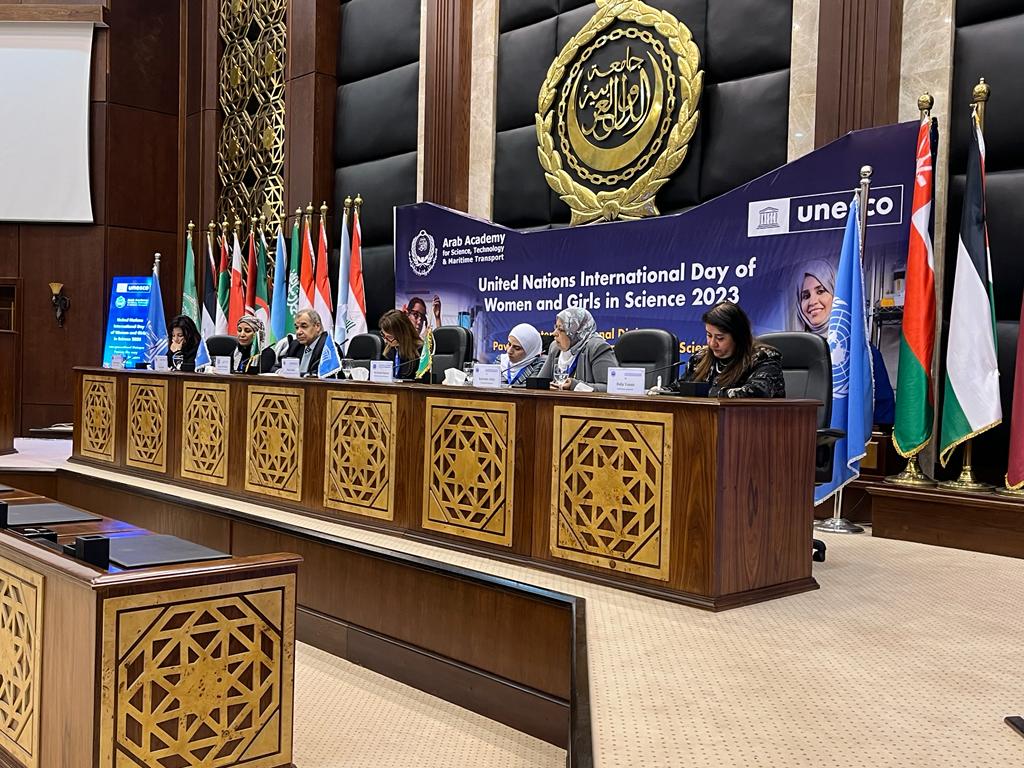
Event Outcomes and results included:
- Engaging more than 115+ participants (majority of whom were women) from different age groups ranging from 17 to 70 years old and from different scientific fields in an intergenerational dialogue
- Identifying the main challenges women face in pursuing STEM-related education and careers and propose proven ways to overcome these challenges
- Building a network of women from different generation backgrounds and across institutions and partners to empower each other in their professional pathways and to act as potential mentors
- Developing a concrete set of recommendations based on 4 working groups’ discussions from 4 thematic areas, including 1) Engineering and Technology; 2) Pharmacy and Medicine; 3) Maritime Studies; and 4) Archaeology and Cultural Heritage) that address gender stereotypes, biases, and aims to overcome the gaps in science education and career progression
Recommendations:
- Invest in science education and build the capacities of scientists/teachers to become good educators and encourage more youth to pursue careers in science
- Foster Women Career Continuity
- Increase awareness on gender stereotypes and bias in the classroom and workplace, as well as gender gaps in the sciences
- Empower women entrepreneurs and allocate more funding opportunities for them
- Support policies to promote better work-life balance and well-being for female scientists
- Foster platforms and initiatives that provide mentoring and networking opportunities to encourage female scientists to continue and progress in the different fields of science.
- Encourage interdisciplinary learning
- Support archaeological work that involves more women
- Ensure equal representation for women in training opportunities
- The private sector should offer more internships, scholarships, and mentoring programs specifically dedicated to women in science.
- Educators should identify and recognize the potentials of female students in science and provide them with necessary support.
- Provide more support through funding and resources through Ministries to female scientists.
- Initiatives to ensure the inclusion of women in documenting and preserving intangible heritage.
- Media professionals should spread awareness, creating positive narratives about the importance and value of women in science.
- Encourage the integration of innovative ideas into the museum sector in order to include female perspective in curation and display
- Encourage media to foster more role models by shedding the light on successful women and girls in science (ex: Samira Moussa) to set good examples for the younger generations to follow
- Highlight the role of women as guardians of heritage and active contributions to the fields of museums, archaeology, and heritage preservation
To learn more about this event and its outcomes please visit: https://www.unesco.org/en/fieldoffice/cairo
Engaging women at all scales of water research
By Belaynesh Birru, Managing Director, Save the Future and Network Member, Ethiopia
Women can make a deeply meaningful contribution as researchers in the scientific study of water and sanitation. Hydrology and water engineering and sciences have attracted too few women. A better gender balance in the water sector is long overdue. It is high time that the water sector harnesses that potential.
Women are the most powerful advocacy force. The complexities of water resource management can thwart even the most mature governments and their leaders. Women have a unique position to galvanize political will and drive forward much needed government investment to help deliver safe drinking water to millions of people who do not currently have access. In all these ways, women need to be part of the decision-making process for better water management.
It is a given that expansion of water investment and infrastructure has a net benefit to the economy and society. This is stimulated in no small part by unleashing the potential of women as the principal economic actors and stewards of a society’s well-being. After all, the well-being of a woman has a direct correlation with increased household expenditure, education, opportunity, and productivity, and as such contributes to the achievement of many SDGs.
In Ethiopia, the lack of access to clean water and sufficient sanitation has a disproportionately negative impact on women and girls. This is a result of not being able to attend classes or work because of having to spend time getting water, seeking a restroom, or caring for sick family members and children. The men are often away from home, while women are the ones using and managing water day-to-day.
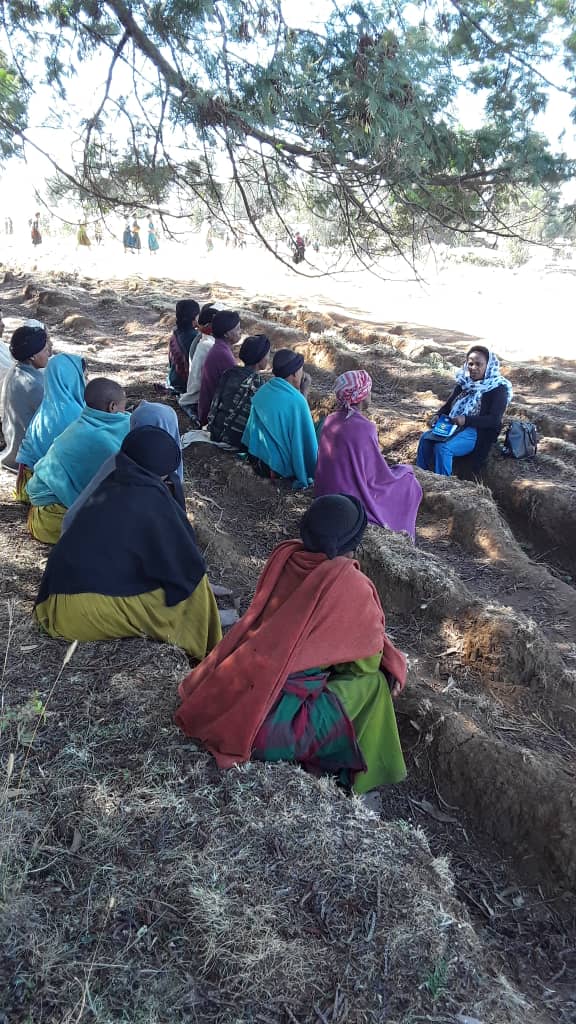
In addition, in the context of Ethiopia, to promote the advantages of domestic latrines, hand washing, personal hygiene, household cleanliness, and better toilets, the safe water chain, and payment for water, women’s groups utilize a lot of water. Additionally, women work as teachers of hygiene and sanitation, extension workers, and caretakers. Women can quickly transform technology.
For example, Save the Future has been conducted an awareness creation and training on water management and sanitation issues across the western Ethiopia Amhara regional state and the East Gogam Zone. As the picture illustrates, participating women are largely farmers and housewives. Although they have not yet received a formal education with water issues, they can formulate problems and share solutions. And since sanitation issues remain problematic, we are advising researchers to engage women in their research to get the most relevant information. As Save the Future, a local NGO working with rural women and youth on environment and climate change issues, we will continue our efforts to support women to improve the sanitation issues and to achieve SDGs.
By 2030, all people must have equitable access to clean, inexpensive drinking water, according to the Sustainable Development Goal for water and sanitation set by the UN. Women are well suited to lead this initiative. In terms of critical global leadership qualities including perspective, self-awareness, cultural curiosity, empathy, alignment, collaboration, and integration, women’s leadership and decision making is essential!
To learn more about Save the Future’s engagements please visit: https://savethefuturedevelopmentassociation.com/

